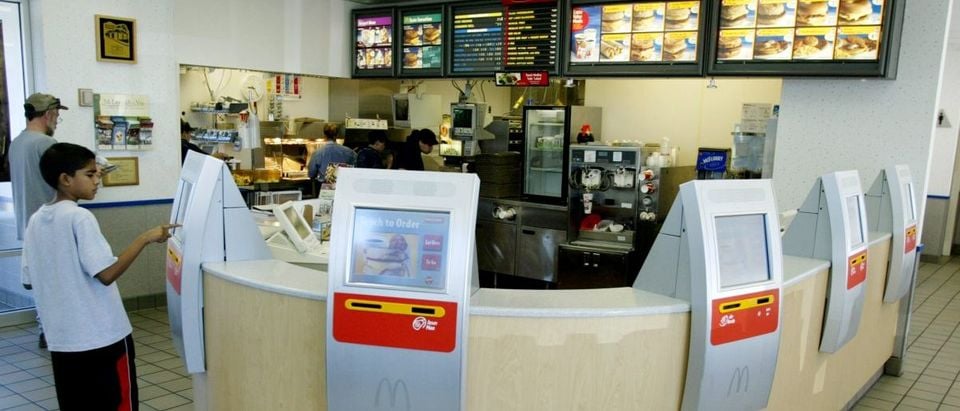For decades, the McDonald’s cashier has been the prototypical minimum-wage employee. Time for a new prototype, folks, since within a few months customers at nearly all the chain’s 14,000 branches will be ordering on their cell phones. Given the alternative (waiting in line), “you want fries with that?” is headed for catchphrase heaven.
Now, McDonald’s insists that innovations like mobile ordering and soon-to-be-installed kiosks do not represent “labor replacement” but rather “customer service.”
McBull.
As cities and states raise minimum wages to as much as $15 an hour, companies that rely on unskilled labor are cutting labor costs. Of course they are, though those like McDonalds with low-income customers will never tell you why. But businesses don’t spend a dollar when they can spend 50 cents. Employees who contribute less than their pay don’t stay employees for long.
The well-intentioned but facile conservative argument that higher minimum wages raise unemployment isn’t working. Liberals smugly respond with studies showing no correlation, and we counter with contrary research. Instead, let’s show how their general-employment studies obscure the devastating effects of wage floors on the job prospects of workers at the bottom.
In the short run, many middle and lower-middle class workers admittedly benefit from “living wage” laws. It’s hard for a company to find technology that will replace a middle manager, for example, so they will – at first – adjust to the higher wages. In 2017, machines can (mostly) do only mechanical jobs, like taking fast food orders.
And I don’t resent the people who want living-wage laws to boost the income of Americans on the cusp of the American Dream. This country was built on middle-class aspirations, and if a voter or politician prioritizes a (likely temporary) boost up the ladder for those who are already on it, I respect that.
But I have other priorities. Higher minimum wages are devastating for the Americans already suffering most, because they struggle to contribute even the worth of the old minimum wage. I’m talking about:
- single mothers with difficult schedules;
- inner-city residents without transportation;
- people who did not complete high school;
- adults with intellectual disabilities or mental illnesses;
- gay and transgender teen runaways;
- recovering addicts;
- recently incarcerated people; and
- homeless people without a reliable address or phone number.
Even sympathetic employers will find it hard to justify hiring such people at current wages, since many of them have limited skills or can be hard to rely on. But they would be appealing candidates for low-end jobs with commensurate wages.
And that’s the biggest tragedy of the minimum wage. When there’s an open job, someone in one of the categories above may not have the education, or experience, or references to push her resume to the top of the pile. But she can beat the competition on price – if the government didn’t forbid her to do so.
So the victims of the minimum wage don’t have the dignity of a day’s work. They rely on public assistance. They may turn to the underground economy (drugs, prostitution, fraud).
Now, if you listen to many liberals, minimum wage laws are all about puppies and candy corn; everyone wins except corporate fat cats. It doesn’t work that way. Raising the minimum wage favors those in the middle over those at the bottom – and if that’s what you want, OK. But when I try to decide which Americans to boost, I’m going with the poorest ones.
And guess what? Admitting that minimum wages help workers in the middle but hurt the ones who need the most help is also good politics. When liberals accuse conservatives of expecting working families to survive on $X a month, we can pivot the conversation to the practical result of their policies – that other families will have to survive on $0 a month. Let the liberals be the ones looking heartless this time.
Our economy is in transition, and I cannot predict where the low-end jobs of tomorrow will be. I do know this, though. If “living wage” laws mean there won’t even be any low-end jobs, the millions of Americans victimized by wishful-thinking do-goodery will grow even more desperate. Some may have a hard time feeding their families at all.
That’s not what “fast food” was supposed to mean.
David Benkof is a columnist for The Daily Caller. Follow him on Twitter (@DavidBenkof) and Muckrack.com/DavidBenkof, or E-mail him at DavidBenkof@gmail.com.


